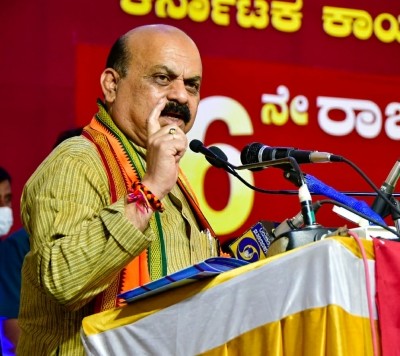
Bengaluru, Bulldozer politics of initiating punitive action against rioters and violence-mongers in Uttar Pradesh, Madhya Pradesh and New Delhi has triggered debates all over the country.
Karnataka Chief Minister Basavaraj Bommai, however, has declared that there is no place for bulldozer politics in Karnataka.
Though for the time being, bulldozer politics doesn't seem to be an issue in Karnataka, experts say that it is going to be a reality soon in the southern state.
Talking to IANS, political analyst Basavaraj Sulibhavi said that the developments such as bulldozer politics could be prevented only if all the forces together put up a cultural fight against it.
"But we are seeing no such unity in the opposition. If the BJP retains power in the upcoming Assembly elections in 2023, we could very well see bulldozer politics in the state," he said.
However, it is not so easy for the BJP to implement hardcore Hindutva in Karnataka as it has to face opposition from within the party first. The social fabric of the state is harmonious living. Hindus and Muslims live in harmony despite the state witnessing communal rifts in the recent past.
Former Chief Minister B.S. Yediyurappa gave a stern warning during the Covid pandemic not to target minorities, especially Muslims, at the height of the controversy surrounding the Tablighi Jamaat. Yediyurappa had even stated that he would not spare those who indulge in creating hatred and initiate legal action, much to the chagrin of the Hindutva forces.
Yediyurappa also made a statement that it won't be possible to win elections in Karnataka only by taking the name of the Prime Minister.
Presently, Bommai is stating that there wouldn't be an Uttar Pradesh or Gujarat model in Karnataka.
The state government had reined in large-scale communal violence which erupted after the murder of Bajrang Dal activist Harsha in Shivamogga and the violence that followed after the posting of objectionable social media posts hurting religious sentiments in Hubballi.
Though invoking of the Unlawful Activities (Prevention) Act (UAPA) on the accused was questioned, the ruling BJP government ensured return of normalcy without giving room for further violence.
Talking to IANS, senior BJP leader G. Madhusudhan said that bulldozer politics was practised by the Congress itself in 1975.
Late Sanjay Gandhi, the son of late Prime Minister Indira Gandhi, carried out bulldozer politics in Turkman Gate, he said.
Actually, the model of bulldozer politics was started by the Congress, Madhusudhan said.
"The rioters and violence-mongers, who destroy public property, need to be taught a lesson. Once their property is seized, the people who indulge in violence will realise their mistake," he said.
"It is not possible to move in the old way of dealing with them, by lodging FIR, gathering evidence, filing of charge-sheet and then get them convicted, Madhusudhan added.
Sulibhavi, however, feels that bulldozer politics is the result of right-wing ideology.
"Attaining power through oppression and creating hatred is the basic principle of right-wing philosophy. The BJP is trying to control the public by organised oppression. They will create one common enemy. Earlier it was Dalits, now it is Muslims," he said.
"The state government is indirectly supporting the hatred environment which has come true in terms of the hijab and the Azan controversies," he said.
Opposition Congress and the Aam Aadmi Party (AAP) in Karnataka are on their guard in connection with the bulldozer politics with the fear of losing out majority Hindu votes.
Hailed as one of the most progressive states in the country, housing major scientific research centres, with Bengaluru being the Silicon Valley of India, Karnataka is passing through testing times.
It is to be seen how things shape up in the southern state in the coming days.


.jpeg)

